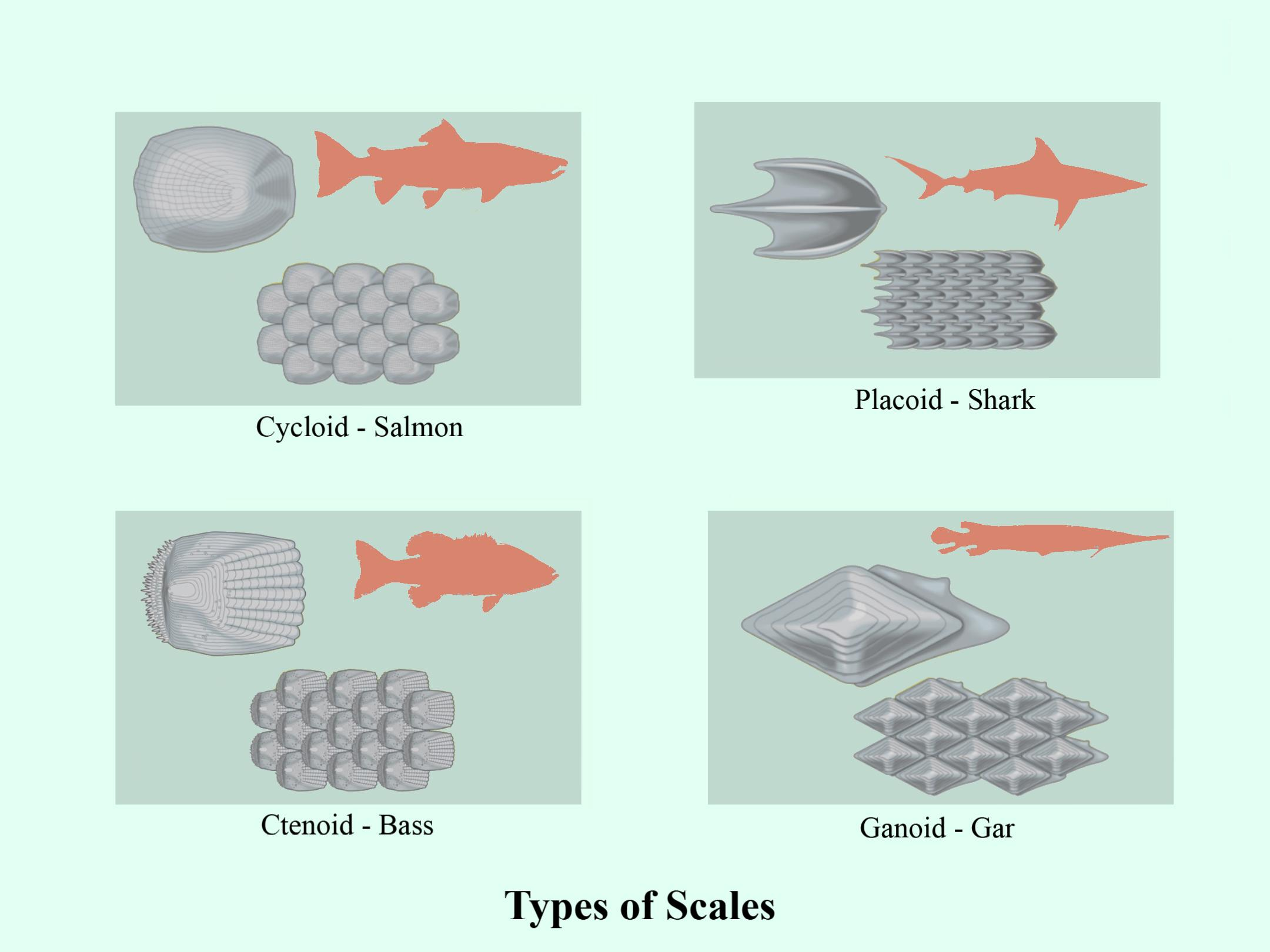
Which type of scales are found on the skin of cartilaginous fishes?
(a)Cycloid
(b)Ctenoid
(c)Gonoid
(d)Placoid
Answer
570k+ views
Hint: A small rigid plate that grows out of a fish's skin is a fish scale. These protective scales, which can also provide effective camouflage through the use of reflection and coloration, as well as possible hydrodynamic benefits, cover the skin of most fishes.
Complete answer:
-The size, shape, structure, and extent of the scales vary enormously, ranging from strong and rigid armour plates in fish, such as shrimpfish, to microscopic or absent in fish, such as eels and anglerfish.
-The cycloid scales of salmon and carp, or ctenoid scales of perch, or the ganoid scales of sturgeons, cover most bony fishes.
-Cartilaginous fishes (sharks and rays) are coated with placoid scales.
-Often called dermal denticles, the placoid scales of cartilaginous fishes are structurally homologous to vertebrate teeth.
Additional Information:
-Instead, some animals are covered by scutes, while others on part or all of the skin have no outer coating.
-The scales of bony fish have been proposed to be similar in form to teeth, but they are likely to come from different origins.
-Most fish are often coated in a film of mucus or slime that can defend against pathogens such as bacteria, fungi, and viruses and minimize surface resistance when fish swim.
-Fish scales are part of the integumentary system of fish and are developed from the dermis mesoderm layer, which distinguishes them from reptile scales.
-The same genes that are involved in mammalian tooth and hair growth are also involved in the development of scales.

So, the correct answer is ‘Placoid’.
Note:
-It is possible to use the morphology of a scale to identify the fish species.
-The word scale is derived from "escale" from the Old French, meaning a shell pod or husk.
Complete answer:
-The size, shape, structure, and extent of the scales vary enormously, ranging from strong and rigid armour plates in fish, such as shrimpfish, to microscopic or absent in fish, such as eels and anglerfish.
-The cycloid scales of salmon and carp, or ctenoid scales of perch, or the ganoid scales of sturgeons, cover most bony fishes.
-Cartilaginous fishes (sharks and rays) are coated with placoid scales.
-Often called dermal denticles, the placoid scales of cartilaginous fishes are structurally homologous to vertebrate teeth.
Additional Information:
-Instead, some animals are covered by scutes, while others on part or all of the skin have no outer coating.
-The scales of bony fish have been proposed to be similar in form to teeth, but they are likely to come from different origins.
-Most fish are often coated in a film of mucus or slime that can defend against pathogens such as bacteria, fungi, and viruses and minimize surface resistance when fish swim.
-Fish scales are part of the integumentary system of fish and are developed from the dermis mesoderm layer, which distinguishes them from reptile scales.
-The same genes that are involved in mammalian tooth and hair growth are also involved in the development of scales.

So, the correct answer is ‘Placoid’.
Note:
-It is possible to use the morphology of a scale to identify the fish species.
-The word scale is derived from "escale" from the Old French, meaning a shell pod or husk.
Recently Updated Pages
Master Class 11 Computer Science: Engaging Questions & Answers for Success

Master Class 11 Business Studies: Engaging Questions & Answers for Success

Master Class 11 Economics: Engaging Questions & Answers for Success

Master Class 11 English: Engaging Questions & Answers for Success

Master Class 11 Maths: Engaging Questions & Answers for Success

Master Class 11 Biology: Engaging Questions & Answers for Success

Trending doubts
One Metric ton is equal to kg A 10000 B 1000 C 100 class 11 physics CBSE

There are 720 permutations of the digits 1 2 3 4 5 class 11 maths CBSE

Discuss the various forms of bacteria class 11 biology CBSE

Draw a diagram of a plant cell and label at least eight class 11 biology CBSE

State the laws of reflection of light

10 examples of friction in our daily life




